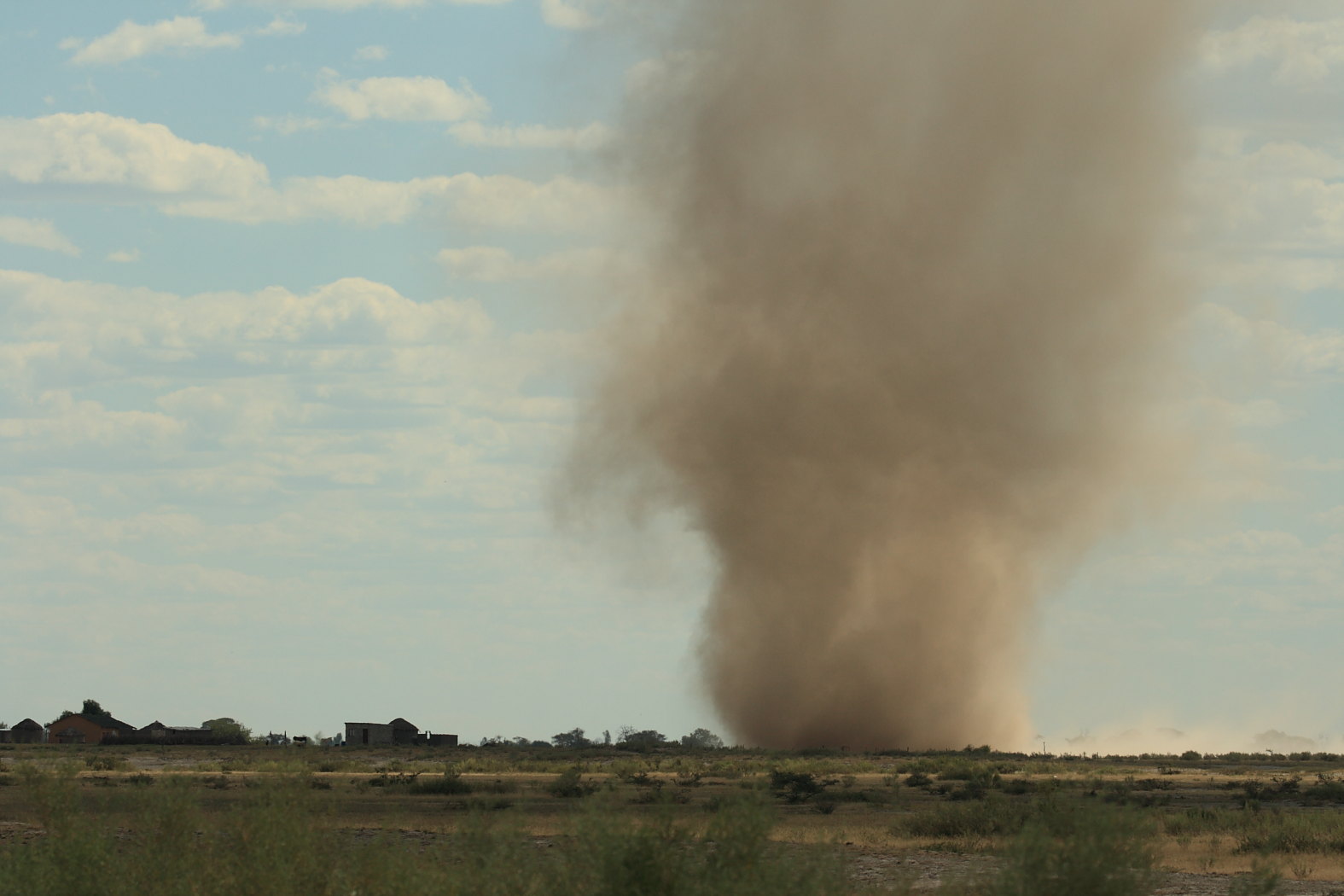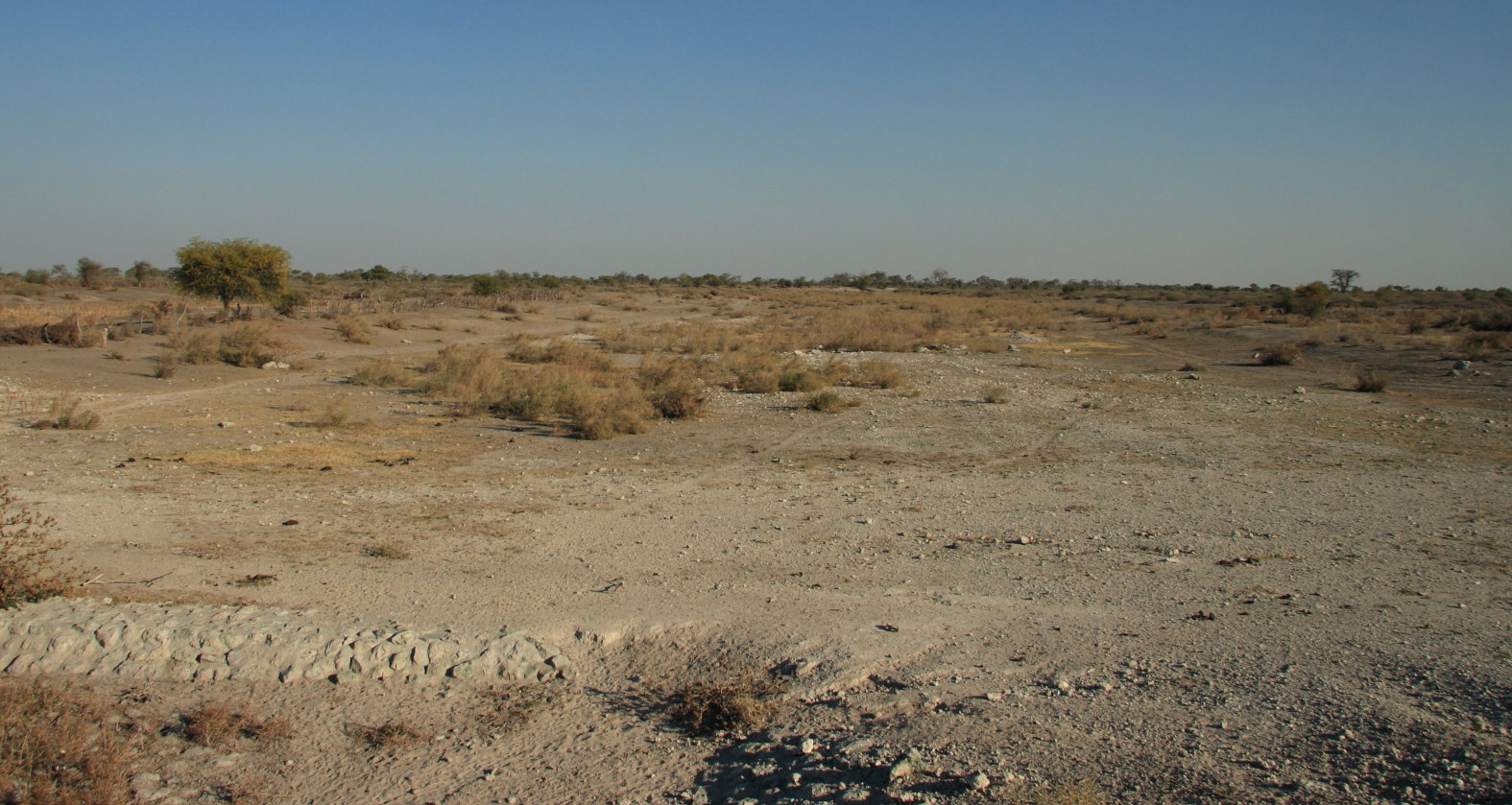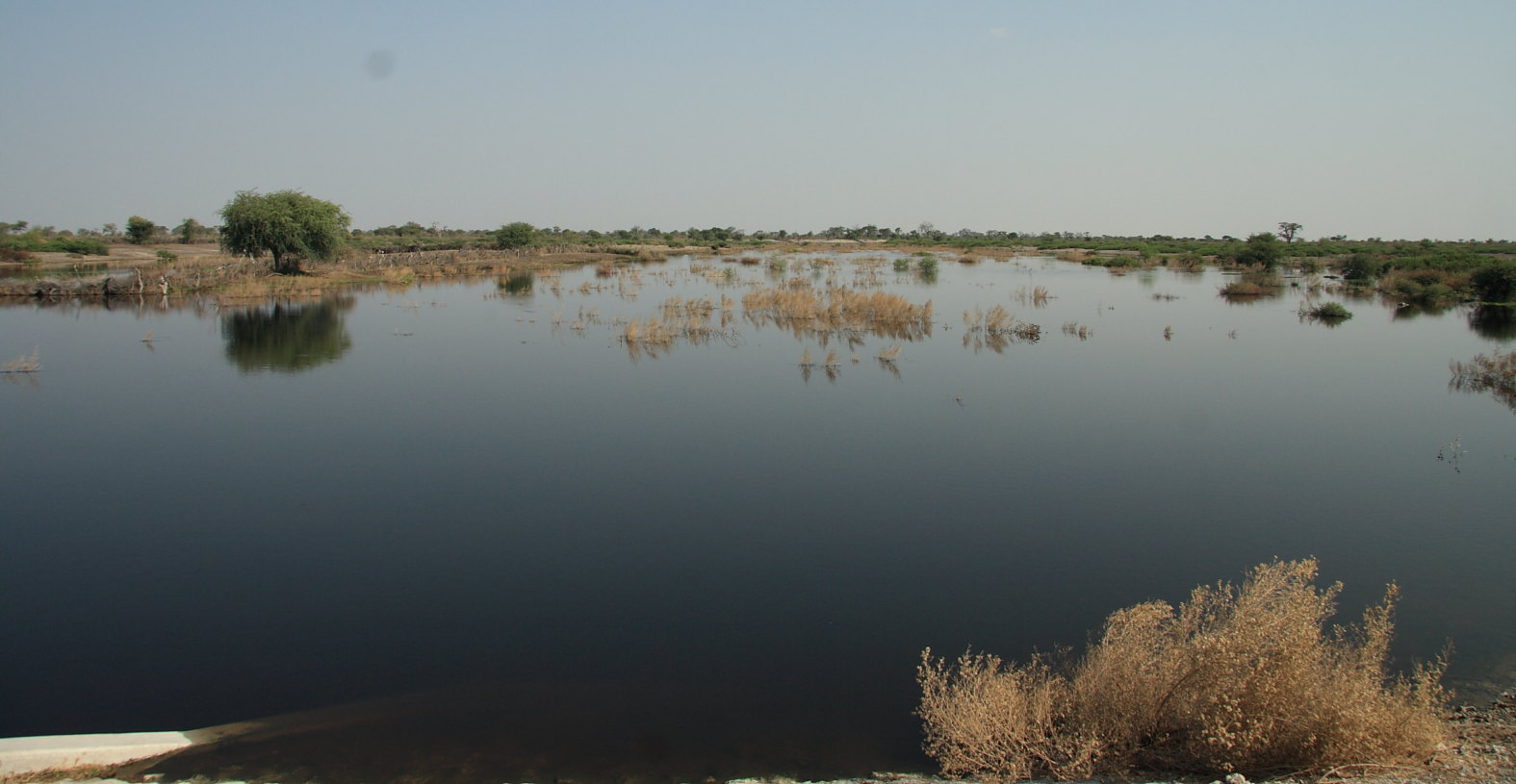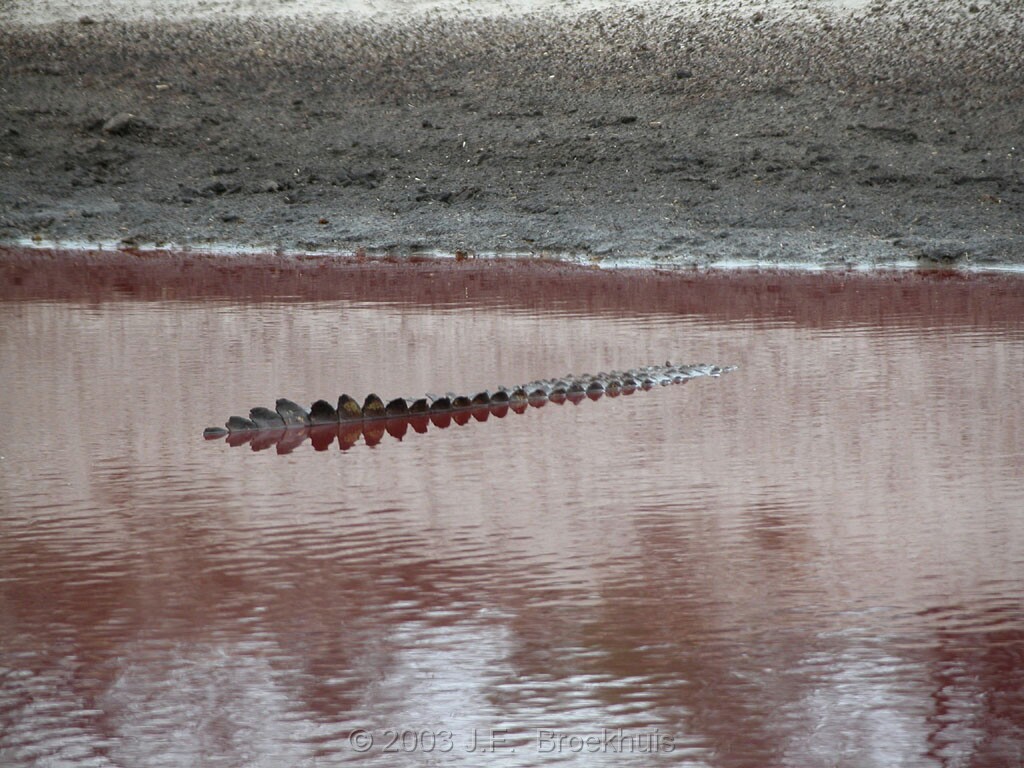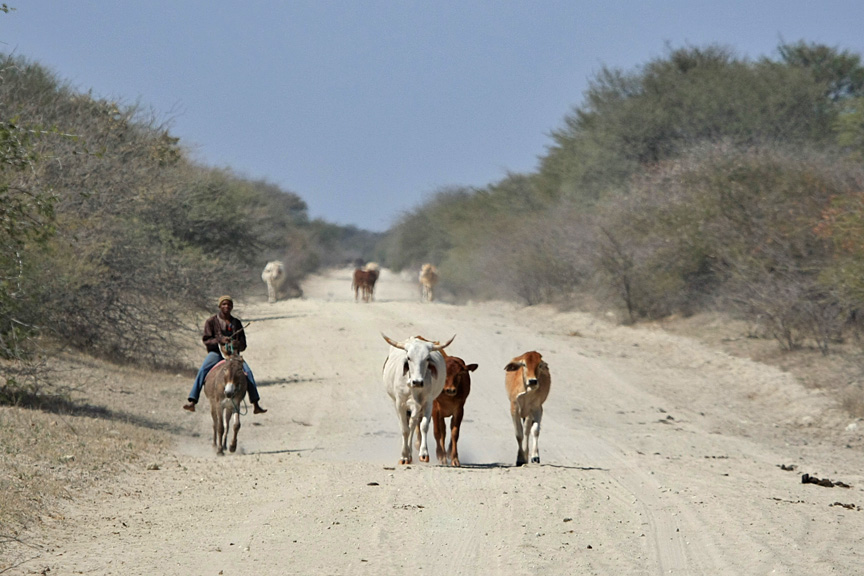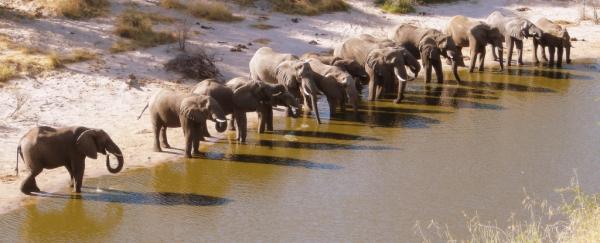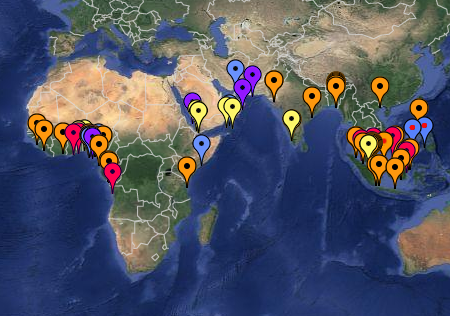Rakops: A village divided by a river
published: Friday, 19 August 2011
by Ryder Gabathuse
RAKOPS: A whirlwind picks some white soft sand, shakes it into the air forming a long admirable sand line in front on the van as we arrived in the Boteti village of Rakops.
This is how we were welcomed in grand style at Rakops. Generally, the entire Boteti sub district is very dry and it was not by fluke that the whirlwind displayed its prowess and swept a cloud of white dust into the air. In fact, the whole morning of Tuesday was characterised by white dust from the cement-like sand in the village.
From Mokoboxane to Makalamabedi in Boteti, the winds were reportedly common. As forewarned is foretold, an Inspector of Botswana Police, Julius Sefatlhe, had warned the Mmegi team the day before our visit that we should brace ourselves for the dust.
As it turned out, the enraging clouds of dust in the village were seemingly not a problem to the villagers as that is part of life in Boteti, anyway. The main concern to the villagers is the flooded Boteti River, which has been dry for a long time and has never been flooded in recent times except nearly two decades ago, as revealed by the villagers.
All roads in the entire sub-district and beyond lead to the Boteti River where hundreds of curious people come on a daily basis to see the airboat transporting villagers from one side of the village to the other. And of course to view the rising level of water in the Boteti River where the bridge that used to allow people to cross the once dry river has submerged into the river. The shallow one-way bridge has also burst as a result of the strong current of the water flowing eastwards.
A good number of the village’s youth have never seen the river flooded. Never! So they gather in large numbers to marvel at the mighty Boteti River as it meanders cutting Rakops village into two. The river has left a trail of frustration and destruction on its wake and it has imposed an unofficial ‘curfew’ as the Botswana Defence Force (BDF) air boat captained amongst others by Corporal Joseph has come to the villagers’ rescue transporting people between 6am and 6pm. Beyond the stipulated times, there is no transport across the river.
But there are reports that frustrated people returning from drinking sprees take chances to swim across the river and only to be swept away by the strong water currents.
There is desperation as the water level reportedly continues to rise which informs the villagers that it will rather take longer before normalcy returns. On both sides of the submerged bridge, linking the Herero ward to the rest of the village, there is a screaming notice warning users that the bridge has been closed. Frustrated motorists and pedestrians watch helplessly as the angry waters of the flooded river cut through the cracks of the bridge.
Ploughing fields and shallow boreholes are submerged in the river. As the river has been dry for a long time, villagers were already used to scratching the soil to plough certain crops. Because inside the river one needed not to dig deeper to reach the moisture. Villagers had dug boreholes to water their livestock and for their domestic needs. This practice has died naturally as the flooded river has filled up all the boreholes and washed away poles marking the ploughing fields. Motorists parked on both sides of the river tell the story that as long as there is no strong bridge connecting the Herero ward to other village wards, then motor vehicles will not be able to cross the river. Motor vehicle owners join the rest of the villagers in using the airboat to cross the river abandoning their vehicles on the side of the river.
Churchill Leburu, 24, is a resident of Rakops and the last time he witnessed the Boteti River flooded was around 1992-1993 at Tsoi cattlepost outside the village.
“Even then, the river was not as flooded as it’s now. I am here accompanying my friend who has gone to fetch his bag from the other side of the river as we are preparing to leave for Maun in no time,” says Leburu, adding, “The floods threaten to destroy some of the yards that are built by the riverbank. Our people have their own way of doing things and you can’t advise them.”
For his part, Boineelo Teseletso from Majashango ward in Rakops last saw the Boteti River flooded in 1992, but the water was just flowing in the middle of the river. The 26-year-old says with abundant water in the river, they would be able to water their livestock. People also fish in the river although at the moment, with such heavy inflows coupled with high velocity of the water, it’s still difficult to fish. Some youthful visitors just come to the river for recreational purposes, just for photo shoots, whilst others wash their clothes by the riverbank. Some choose to bath in the river whilst others risk their lives by swimming.
“Some people unfortunately have drowned in the river and I have heard about 12 of or more who have perished at different points of the river,” says Teseletso. He was worried that the majority of those who have drowned made their decisions to swim across the flooded river allegedly under the influence of alcohol or drugs because there was nothing to help them to cross.
Teseletso is worried that the flooded river brings with it crocodiles which for a long time have not been common in the village and “they kill innocent sheep and goats especially along the cattleposts”. “The river,” he says, “is infested with hippopotamuses and it was spotted there recently and this further endangers the lives of the villagers as they don’t know how to handle them in the event they come into contact with them.”
He is further excited that in no time, a plant known as tswii – a potato-like edible plant will be in abundance in the river for the villagers to harvest.
“The water is expected to last longer in the river and benefit the people for various uses, in an area that experiences an acute water shortage,” he says. Villagers who were using small engines to pump water from shallow boreholes in the river are now relieved.
A power line crossing the river to the Herero ward is apparently in danger of being swept away by the strong currents of the river as it was probably constructed during the dry spell. With the water having swept part of the bridge away, it will apparently take a miracle for the electric poles to enjoy any further support in the river. Once the power line is swept away, this could affect the power supply in the Herero ward. Edward Juta is a resident of Herero ward and had just disembarked from the airboat when Mmegi caught up with him for this interview. He says although the Boteti River was flooded in 1993, the water never went over the narrow bridge.
“This river has been dry for a long time and it never dawned on us that one day we will be unable to cross the river from our usual point. We had already written the obituary of the river,” he tells Mmegi on the riverbank.
But from last year, Juta, 62, started witnessing a lot of water flowing into the river. “We get a lot of services this side than the Herero side and that is why there is more movement to this side,” he says indicating that offices of the Land Board, police station, primary hospital and almost everything are on the southern part of the village. On the Herero side there is only the primary school, a clinic without maternity wing and a small kgotla.
Every morning, primary school pupils line up on the bank of the river waiting to be transported to school. Majority of the pupils are from the south heading North and the reverse process goes on later in the afternoon after school as they head home. From the Herero ward about 100 students or more compete for places in the airboat with their parents heading for work. The process would play itself later after hours as parents and students head back home. BDF’s Corporal James operates the airboat between 6am and 6pm and beyond that, people fend for themselves.
“Village developments were planned at a time when the river was still very dry and shallow. There is just no way in which such poles could be in the river because besides being blown away, a pole like that could rot as a result of incessant exposure to water.” Rakops has about nine wards, which include Herero, Jakopo, Dambe, Kopo, Majashango, Sesongwa, Kazeremana, Mosanga and another. Languages spoken in the village include Seherero, Sekalaka, Senanjwa, Sesarwa and Seyeyi. Herero ward chief, Cornelius Mupahua says the last time the Boteti River was flooded like today was in 1993. He observes that once the river is flooded it gives the villagers a tough time to cross to the other side.
“Everything that we need is that side of the river and we really feel punished to be denied an opportunity to reach the other side of the village as and when we need to. Look, our vehicles cannot cross here because the bridge had burst and this is bad,” said 77-year-old Mupahua. He estimates that the Herero ward could be home to about 1,000 residents who now literally depend on the BDF airboat to lift them across. Mupahua remembers that in the past years, a certain Jim Railey used to assist the villagers with his private boat.
As one of the first villagers to own a car in the village, he used to transport people by going as far as Mopipi, about 65km to reach Rakops. Mupahua says the villagers do have ploughing fields in both the river and inland, but with their fields submerged into the river, “we have presented our plight to the office of the District Commissioner, area MP and other stakeholders.” He was worried,”it does not seem there is anyone keen to come to our rescue during these trying moments.” Boteti River originates from the Okavango Delta, which is fed by rivers from Angola. It then passes through many villages in Boteti before finally reaching Lake Xhau where the river ends.
Mupahua was worried that even when the villagers report incidents of crime to the police during odd hours, they know they will not get help due to lack of transport across the river at night.
Rakops chief, Gonkgang Mankgatau echoed sentiments raised by other villagers that the rising water level in the river disrupts movement of the people in the village. “The river divides the village and the painful is that the bulk of the services in the village are provided in the southern part of the village.” Mankgatau, who is also a devout Christian, was worried that there are still people who disregard wise counsel and end up drowning in the river.
“We talk to them, and they don’t listen,” he declares, scratching his bald head,” and further declares, “as recreational facilities are concentrated in the southern part of the village, people are tempted to cross the river even in the middle of the night as they just can’t wait.”
Mankgatau fears that if the inflow continued at its current rate, “the majority of roads in Boteti could end up closed as the bridges are mostly lower and run the risk of bursting.” He is also fearful that waterborne diseases are likely to spread in the entire sub district since villagers who used to drink clean water from the sunken boreholes are now drinking from the flooded river.
“We don’t know how safe this water is to drink since lately in the country reports of diarrhoea have been spreading like veld fire and many people could find themselves in trouble.” Mankgatau says in the past, villagers used to plough twice in a year in the river but with the current water levels, it will not be possible since we expect the river to hold the water even longer. The flooded river has amongst others attracted herds of elephants that roam freely in the village and could be a danger to the villagers since they are not used to them.
“Elephants scare people because they are not used to the jumbos. But, we continue warning people to watch out for these things,” he says and adds that crocodiles and hippopotamuses that come with the river are also part of the troubles the villagers endure.
He says even those who have passion for fishing, do have challenges now as the water level is still high and its’ still flowing at a high speed which poses risks of people sliding into the river.
View Boteti River in a larger map

